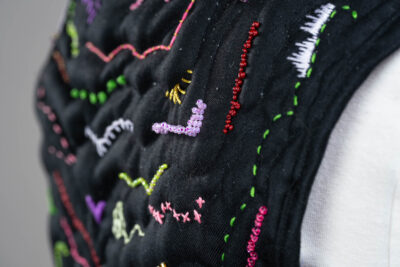A fashion design undergraduate from Nottingham Trent University who has a chronic pain condition has created a clothing range to help people, like her, who have hidden disabilities.
Tegan Cooke, 21, who has fibromyalgia which causes fatigue, insomnia and pain in her joints, has made a range of elevated loungewear to support people with similar conditions.
Tegan, who is studying BA Fashion Design at Nottingham Trent University, has centred her designs on the use of pressure therapy to provide a small amount of compression to the shoulders and knees in order to provide the wearer with comfort, as similar to a weighted blanket.
The garments feature quilted shapes which contain about one kilogram of tiny glass beads to provide calm-inducing pressure without being overly heavy.
The edges of the garments are bound so they are flat and smooth and the beads only require small stitching to secure them inside the garment.
Tegan, from Tilehurst in Reading, incorporated an aesthetic of crystals as a metaphor for diamonds becoming strong under pressure.
She said: “Inclusive fashion is the next big thing, but I don’t think that people with hidden disabilities are catered for by the accessible market yet.
“I wanted to create clothing that helps relieve people’s symptoms, but which isn’t plain and boring. So I’ve designed elevated loungewear that’s comfortable, functional and fun.
“The pressure helps secure ‘clicky’ joints and prevents them from moving out of place and being uncomfortable. It also gives comfort to achy legs and makes the clothes soothing to wear.”
Tegan’s designs include a long wrap coat with beads on the shoulders and at the hemline to provide pressure on the shoulders and knees whilst sitting. She has also created stylish wrist supports in fun colours complete with a trim so that they don’t fray.
The designs feature embroidery made from beads which provide a tactile quality for the wearer to rub with their hands, which can be therapeutic.
The garments are intended to be worn as part of a layering style to support people who are sensitive to changes in temperature, so that they can remove and add items accordingly.
“For my research I spoke to people with arthritis, fibromyalgia and PoTs (postural tachycardia syndrome) and it’s clear that many people of all ages would benefit from these sorts of designs,” said Tegan.
“There’s particularly a niche for garments that consider wearers who have chronic pain, particularly for younger people who would like something on-trend and vibrant.
“Fibromyalgia is not uncommon – almost four per cent of the UK population have it, which equates to about 2.5 million people. So it’s really quite common, which means these sorts of clothes would benefit a lot of people.”
Tegan will see her designs go on public display for the 2023 Student Showcase, one of the largest displays of graduating art and design talent in the UK.
Emma Prince, course leader for Fashion Design at Nottingham Trent University, said: “Tegan has taken her personal experience of a hidden disability and created a range of garments which would literally benefit millions of other people.
“Her designs are simple and easy to incorporate in a wide range of clothing, and in doing so would help improve the lives of so many people who, like Tegan, suffer from chronic pain.”




